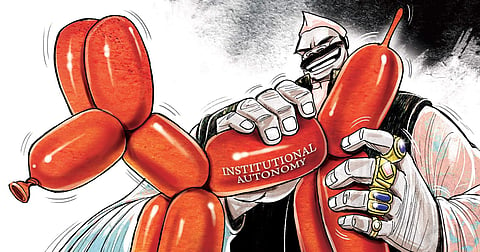

While elected governments are acutely aware of their sovereign powers, they are not so comfortable with institutional autonomy. It is indeed a paradox of modern democracy, as it is practiced in several countries today, that they have an uneasy coexistence. The ruling elites are tempted to arm-twist, coax, convert or intimidate institutions to enfeeble and force them to be their masters’ voice. Such a script is pursued for short-term benefits and to get over immediate discomforting truths. But in the long-term irreparable damage is caused to the larger national interest when professional merit and integrity are compromised and institutional memory is distorted, devalued and often discarded.
In a democracy, where at least every five years there is a change of guard (even if the same party or same alliance comes to power) it is institutional resilience that ensures smooth transition and essential continuity. Once that frame is weakened, democratic transitions can be quite painful and anxious as we see in our neighbourhood. That is why institution builders are remembered with gratitude. Though the Election Commission of India had existed for long, with the arrival of T N Seshan, it acquired new gravitas. Systems and regulations around its core values were redrawn and implemented with firmness. The sheen Indian elections have acquired ever since and the ECI’s increased credibility are a stellar instance of institution building.
Institutions, however exalted they might be, cannot be impervious to changes. There is nothing wrong in the argument that institutions have to change with the times. But how do these changes come about? They have to come from within and not exerted from outside. Though every institution has to continuously respond and adapt to changes, there is always a set of core values that cannot be compromised. For instance the RBI’s regulatory role can never be the subject of negotiation, while how best and how soon the central bank can adjust to the changing demands and expectations should be discussed and debated. Political leadership, by the sheer psychology of power, has the temptation to dictate. Where the culture of control and command operates, autonomy wilts. Once autonomy begins to erode, the immune system of an organisation breaks down and eventually the core values flounder. Finally the very purpose of the institution gets negated by its own irrelevance.
Any intolerance towards institutional autonomy harbours catastrophic consequences. And the weakening of institutions jeopardises the health of democracy. A democracy sans robust institutions can only be a shell. When the CBI washes its old stock of dirty linen before the nation, the awe and trust associated with an agency acclaimed and perceived as highly professional and fair slowly evaporates. One more idol collapses on its foot of clay! Tinkering with the UGC and CVC (and earlier with the erstwhile Planning Commission) for whatever good intent stymies their creativity and motivation. New functions that are becoming increasingly imperative can always be entrusted with existing institutions without compromising on their existing robustness. It takes only a few weeks to nullify the worth and merit of an institution, acquired over a few decades. And precious time is spent again to reboot such mutated (sometimes mutilated) organisations.
At a deeper level it is the lack of adherence to the spirit of democracy that makes institutional autonomy an irritant and inconvenience. I once worked with a minister who was very keen that a particular folk singer had to be given the prestigious Central Sangeet Natak Akademi award. I was on the board in my official capacity. On the day of the meeting I told the minister who gave this difficult brief that I am not the decision-maker though I am a member on the board.
The recommendations are examined by subject experts. Expert or no expert, the minister wanted the crony to be made happy with the award. I did not sin though I tried. I conveyed this wish of the minister to the experts and on hearing the name, the experts gave out an anguished wail in chorus. “Anyone but he,” said they. An award to him will be as lethal as sedition! Such was his worth. Needless to say the minister was furious with me and did not conceal his deep disapproval of my incompetence. Anyway the minister managed to get his nominee a Padma Shri. I discovered in my contemplative moments that the minister truly believes it is a travesty of circumstances that a minster’s wish cannot be carried out. Many around him too think so.
Only robust institutions can convey in no uncertain terms that democracy is not solely about fulfilling ministers’ wishes. Of course, the wishes of elected governments are paramount, but not the whims of individual ministers. The fine distinction often gets lost. That is where institutions with functional autonomy and professional competence have to survive as bulwarks against a misplaced sense of power. The temptation to interfere with the autonomy of institutions is like a warrior removing his armour in a battlefield simply because it is a bit tight and inconvenient. Yet it protects. A penchant for short-term comforts can only lead to long-term vulnerability. These institutions advise thrift while ‘power’ has the temptation to spend. They advise to listen to dissent while ‘power’ wants silence and compliance. They remind that no power is absolute when the temptation is to the contrary. Bitter pills often cure well.
K Jayakumar
Former Chief Secretary to Government of Kerala and former Vice Chancellor of Malayalam University
Email: k.jayakumar123@gmail.com